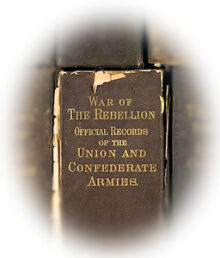FORT SUMTER, S.C., March 27, 1861.
(Received A. G. O., March 30.)
Col. L. THOMAS; Adjutant-General U. S. Army:
COLONEL: I have the honor to report that three heavy guns were landed yesterday at Cummings Point, and that this morning we can only see that they are working at the place at Fort Johnson mentioned in yesterday’s letter. I send herewith a correspondence which has taken place since my last date between Brigadier-General Beauregard and myself. They may have misunderstood a remark which I have made; viz, that if attacked, and I found that I could not hold possession of the fort, that I would blow it up, sacrificing our lives in preference to permitting ourselves to fall into their hands. I hope that the authorities here now understand distinctly that I shall give no pledges whatever. I shall do nothing which is not fully justified by the highest sense of honorable and straightforward dealing and will not permit from any source any insinuation that I have acted in any other manner in the performance of my duty, &c., here.
I am, colonel, very respectfully, your obedient servant,
ROBERT ANDERSON,
Major, First Artillery, Commanding.
[Inclosure No. 1.]
CHARLESTON, S. C., March 26, 1861.
Maj. ROBERT ANDERSON,
U. S. Army, Commanding at Fort Sumter, Charleston Harbor, S.C.:
MY DEAR MAJOR: Having been informed that Mr. Lamon, the authorized agent of the President of the United States, advised Governor Pickens, after his interview with you at Fort Sumter, that yourself and command would be transferred to another post in a few days, and understanding that you are under the impression I intended under all circumstances to require of you a formal surrender or capitulation, I hasten to disabuse you, and to inform you that our countries not being at war, and wishing as far as lies in my power to avoid the latter calamity, no such condition will be exacted of you, unless brought about as the natural result of hostilities.
Whenever you will be prepared to leave the fort, if you will inform Governor Pickens or myself of your intentions relative thereto, we will be happy to see that you are provided with proper means of transportation out of this harbor for yourself and command, including baggage, private and company property. All that will be required of you on account of the public rumors that have reached us will be your word of honor as an officer and a gentleman, that the fort, all public property therein, its armament, &c., shall remain in their present condition, without any arrangements or preparation for their destruction or injury after you shall have left the fort.
On our part no objection will be raised to your retiring with your side and company arms, and to your saluting your flag on lowering it. Hoping to have the pleasure of meeting you soon under more favorable circumstances,
I remain, dear major, yours, very truly,
G. T. BEAUREGARD.
[Inclosure No. 2.]
FORT SUMTER, S. C., March 26, 1861.
General G. T. BEAUREGARD, Charleston, S.C.:
MY DEAR GENERAL: I have the honor to acknowledge the receipt of your letter of this date, and hasten to say that I needed no denial from you of the expression attributed to you. The moment I heard that you had said that I should not leave this fort without surrendering I remarked that it was not true, and that I knew you had not said so. I am much obliged to his excellency the governor and yourself for the assurances you give me, but you must pardon me for saying that I feel deeply hurt at the intimation in your letter about the conditions which will be exacted of me, and I must state most distinctly that if I can only be permitted to leave on the pledge you mention I shall never, so help me God, leave this fort alive.
Hoping that you do not mean what your words express, and in that case cordially uniting with you in the wish that we may have the pleasure of meeting under more favorable circumstances,
I remain, dear general, yours truly,
ROBERT ANDERSON,
Major, U. S. Army, Commanding.
[Inclosure No. 3.]
CHARLESTON, S. C., March 26, 1861.
Maj. ROBERT ANDERSON,
U. S. Army, Commanding at Fort Sumter, Charleston Harbor, S.C.:
MY DEAR MAJOR: I have the honor to acknowledge your letter of this date, and hasten to disabuse you as to any intention on my part of wounding, in any manner whatsoever, the feelings of so gallant an officer by anything I may have written in my letter of this morning.
I only alluded to the pledge referred to by you on account of the high source from which the rumors spoken of appeared to come, and which, in the eyes of many officers of high standing, might be considered a sufficient reason for executing orders which otherwise they would not approve of; but I regret now having referred to the subject.
I remain, dear major, yours very truly,
G. T. BEAUREGARD.
[Inclosure No. 4.]
FORT SUMTER, S.C., March 27, 1861.
General G. T. BEAUREGARD, Charleston, S.C.:
MY DEAR GENERAL: I hasten, in reply to your kind and satisfactory note of yesterday afternoon, just received, to express my gratification at its tenor. I only regret that rumors from any source made you, for one moment, have the slightest doubt as to the straight path of honor and duty, in which I trust, by the blessing of God, ever to be found.
I am, dear general, yours sincerely,
ROBERT ANDERSON,
Major, U. S. Army, Commanding.
